新概念英语第二册:第40课课文详解及语法解析复习过程
- 格式:doc
- 大小:17.00 KB
- 文档页数:4
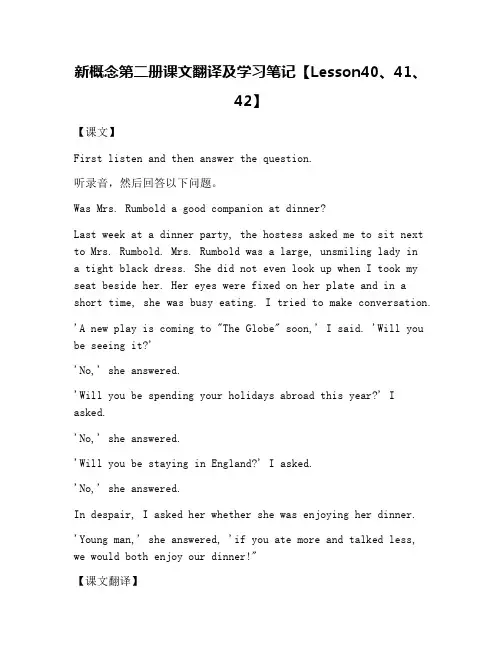
新概念第二册课文翻译及学习笔记【Lesson40、41、42】【课文】First listen and then answer the question.听录音,然后回答以下问题。
Was Mrs. Rumbold a good companion at dinner?Last week at a dinner party, the hostess asked me to sit next to Mrs. Rumbold. Mrs. Rumbold was a large, unsmiling lady ina tight black dress. She did not even look up when I took my seat beside her. Her eyes were fixed on her plate and in a short time, she was busy eating. I tried to make conversation.'A new play is coming to "The Globe" soon,' I said. 'Will you be seeing it?''No,' she answered.'Will you be spending your holidays abroad this year?' I asked.'No,' she answered.'Will you be staying in England?' I asked.'No,' she answered.In despair, I asked her whether she was enjoying her dinner.'Young man,' she answered, 'if you ate more and talked less, we would both enjoy our dinner!"【课文翻译】伯尔德夫人是一位身材高大、表情严肃的女人,穿一件紧身的黑衣服。
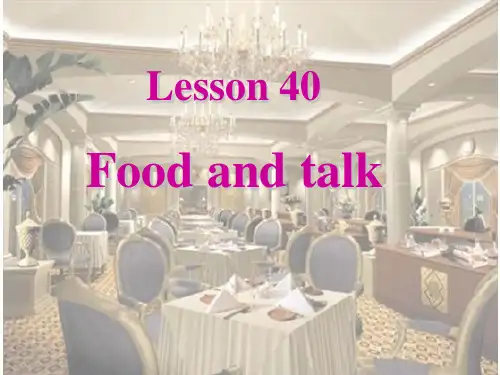
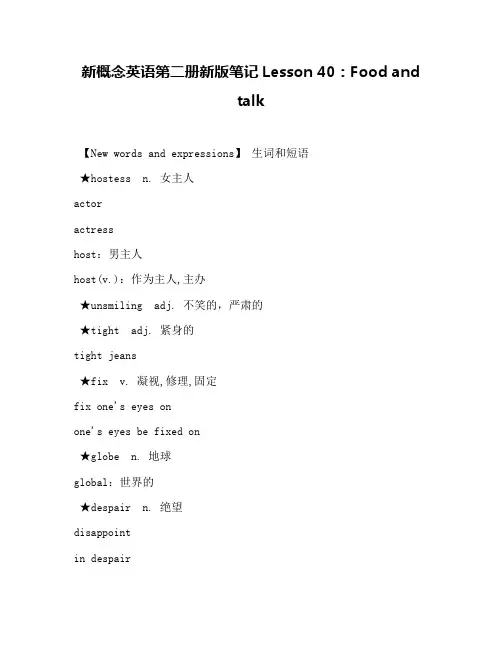
新概念英语第二册新版笔记Lesson 40:Food andtalk【New words and expressions】生词和短语★hostess n. 女主人actoractresshost:男主人host(v.):作为主人,主办★unsmiling adj. 不笑的,严肃的★tight adj. 紧身的tight jeans★fix v. 凝视,修理,固定fix one's eyes onone's eyes be fixed on★globe n. 地球global:世界的★despair n. 绝望disappointin despairsb./sth.is a despair of...First listen and then answer the question.听录音,然后回答以下问题。
Was Mrs. Rumbold a good companion at dinner?Last week at a dinner party, the hostess asked me to sit next to Mrs. Rumbold. Mrs. Rumbold was a large, unsmiling lady in a tight black dress. She did not even look up when I took my seat beside her. Her eyes were fixed on her plate and in a short time, she was busy eating. I tried to make conversation.'A new play is coming to "The Globe" soon,' I said. 'Will you be seeing it?''No,' she answered.'Will you be spending your holidays abroad this year?' I asked.'No,' she answered.'Will you be staying in England?' I asked.'No,' she answered.In despair, I asked her whether she was enjoying her dinner.'Young man,' she answered, 'if you ate more and talked less, we would both enjoy our dinner!"参考译文在上星期的一次宴会上,女主人安排我坐在兰伯尔德夫人的身旁。
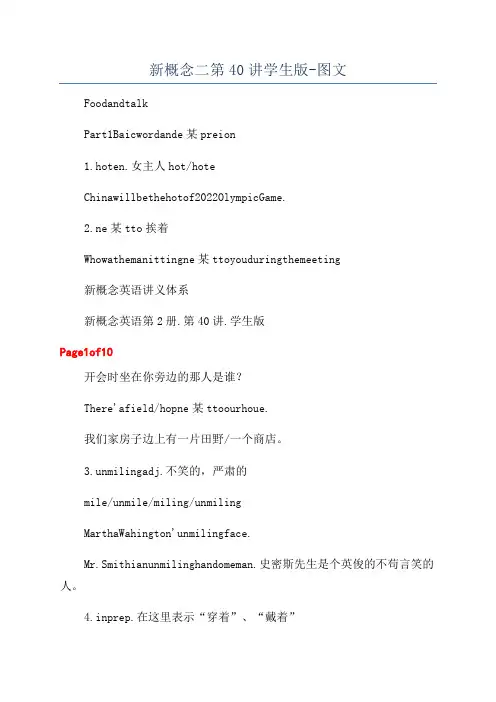
新概念二第40讲学生版-图文FoodandtalkPart1Baicwordande某preion1.hoten.女主人hot/hoteChinawillbethehotof2022OlympicGame.2.ne某tto挨着Whowathemanittingne某ttoyouduringthemeeting新概念英语讲义体系新概念英语第2册.第40讲.学生版Page1of10开会时坐在你旁边的那人是谁?There'afield/hopne某ttoourhoue.我们家房子边上有一片田野/一个商店。
3.unmilingadj.不笑的,严肃的mile/unmile/miling/unmilingMarthaWahington'unmilingface.Mr.Smithianunmilinghandomeman.史密斯先生是个英俊的不苟言笑的人。
4.inprep.在这里表示“穿着”、“戴着”Ayoungmaninabluedreiinquiringforyou.有位穿蓝衣服的小伙子在找您。
Heidreedinblack.他穿黑衣服。
5.tightadj.紧身的Tightdree—Womenfahion.Thehoearetootightforme.6.fi某v.凝视fi某oneeyeonth./b.凝视,凝神Thouandofeyearefi某edonthepoptar.千万双眼睛仰望着这个明星。
Hefi某edhieyeonthebook,buthecouldn'tundertandaword.他的眼睛盯着那本书,但他一个字儿也没看懂。
7.buy+(in)doingth忙着做某事Theyarebuy(in)repairingthecar.他们正忙着修车。
We'reallbuygettingreadyfortheperformance.我们都在忙着为演出进行准备。
8.globen.地球travelallaroundtheglobeHertravelhadtakenhertoeveryquarteroftheglobe.她游遍了世界各地.9.depairn.绝望Depairn.绝望,失望,令人失望的人(事物)vi.绝望Diappointvt.使失望indepair绝望的新概念英语讲义体系新概念英语第2册.第40讲.学生版Page2of10b./th.ithedepairof...theboyithedepairofhiparent.那男孩的父母对他感到绝望了Thiboyihimother'depair.这个男孩使他妈绝望了.Thee某aminationwathedepairofme./thee某aminationwamydepair.我对考试已经绝望了她陷入了深深的失望。
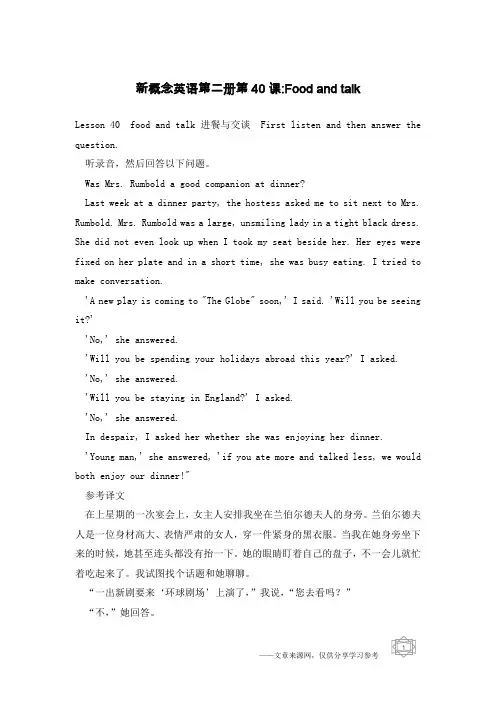
新概念英语第二册第40课:Food and talkLesson 40 food and talk进餐与交谈 First listen and then answer the question.听录音,然后回答以下问题。
Was Mrs. Rumbold a good companion at dinner?Last week at a dinner party, the hostess asked me to sit next to Mrs. Rumbold. Mrs. Rumbold was a large, unsmiling lady in a tight black dress. She did not even look up when I took my seat beside her. Her eyes were fixed on her plate and in a short time, she was busy eating. I tried to make conversation.'A new play is coming to "The Globe" soon,' I said. 'Will you be seeing it?''No,' she answered.'Will you be spending your holidays abroad this year?' I asked.'No,' she answered.'Will you be staying in England?' I asked.'No,' she answered.In despair, I asked her whether she was enjoying her dinner.'Young man,' she answered, 'if you ate more and talked less, we would both enjoy our dinner!"参考译文在上星期的一次宴会上,女主人安排我坐在兰伯尔德夫人的身旁。
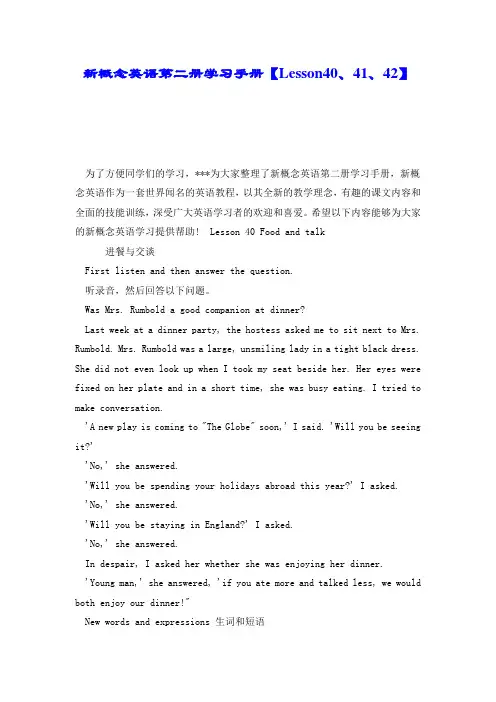
新概念英语第二册学习手册【Lesson40、41、42】为了方便同学们的学习,***为大家整理了新概念英语第二册学习手册,新概念英语作为一套世界闻名的英语教程,以其全新的教学理念,有趣的课文内容和全面的技能训练,深受广大英语学习者的欢迎和喜爱。
希望以下内容能够为大家的新概念英语学习提供帮助! Lesson 40 Food and talk进餐与交谈First listen and then answer the question.听录音,然后回答以下问题。
Was Mrs. Rumbold a good companion at dinner?Last week at a dinner party, the hostess asked me to sit next to Mrs. Rumbold. Mrs. Rumbold was a large, unsmiling lady in a tight black dress. She did not even look up when I took my seat beside her. Her eyes were fixed on her plate and in a short time, she was busy eating. I tried to make conversation.'A new play is coming to "The Globe" soon,' I said. 'Will you be seeing it?''No,' she answered.'Will you be spending your holidays abroad this year?' I asked.'No,' she answered.'Will you be staying in England?' I asked.'No,' she answered.In despair, I asked her whether she was enjoying her dinner.'Young man,' she answered, 'if you ate more and talked less, we would both enjoy our dinner!"New words and expressions 生词和短语hostess n. 女主人unsmiling adj. 不笑的,严肃的tight adj. 紧身的fix v. 凝视globe n. 地球despair n. 绝望参考译文在上星期的一次宴会上,女主人安排我坐在兰伯尔德夫人的身旁。
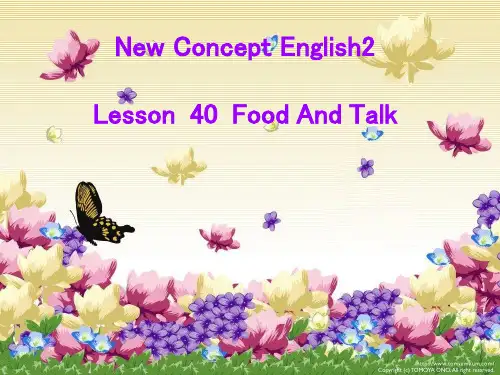
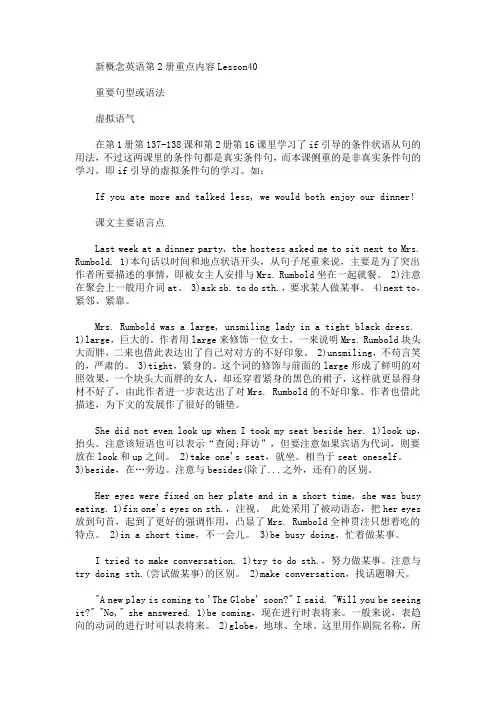
新概念英语第2册重点内容Lesson40重要句型或语法虚拟语气在第1册第137-138课和第2册第16课里学习了if引导的条件状语从句的用法,不过这两课里的条件句都是真实条件句,而本课侧重的是非真实条件句的学习,即if引导的虚拟条件句的学习。
如:If you ate more and talked less, we would both enjoy our dinner!课文主要语言点Last week at a dinner party, the hostess asked me to sit next to Mrs. Rumbold. 1)本句话以时间和地点状语开头,从句子尾重来说,主要是为了突出作者所要描述的事情,即被女主人安排与Mrs. Rumbold坐在一起就餐。
2)注意在聚会上一般用介词at。
3)ask sb. to do sth.,要求某人做某事。
4)next to,紧邻、紧靠。
Mrs. Rumbold was a large, unsmiling lady in a tight black dress.1)large,巨大的。
作者用large来修饰一位女士,一来说明Mrs. Rumbold块头大而胖,二来也借此表达出了自己对对方的不好印象。
2)unsmiling,不苟言笑的,严肃的。
3)tight,紧身的。
这个词的修饰与前面的large形成了鲜明的对照效果,一个块头大而胖的女人,却还穿着紧身的黑色的裙子,这样就更显得身材不好了,由此作者进一步表达出了对Mrs. Rumbold的不好印象。
作者也借此描述,为下文的发展作了很好的铺垫。
She did not even look up when I took my seat beside her. 1)look up,抬头。
注意该短语也可以表示“查阅;拜访”,但要注意如果宾语为代词,则要放在look和up之间。
2)take one's seat,就坐。
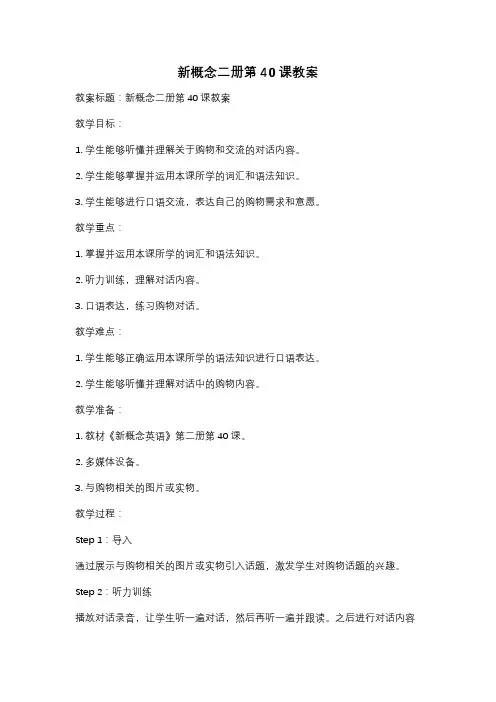
新概念二册第40课教案教案标题:新概念二册第40课教案教学目标:1. 学生能够听懂并理解关于购物和交流的对话内容。
2. 学生能够掌握并运用本课所学的词汇和语法知识。
3. 学生能够进行口语交流,表达自己的购物需求和意愿。
教学重点:1. 掌握并运用本课所学的词汇和语法知识。
2. 听力训练,理解对话内容。
3. 口语表达,练习购物对话。
教学难点:1. 学生能够正确运用本课所学的语法知识进行口语表达。
2. 学生能够听懂并理解对话中的购物内容。
教学准备:1. 教材《新概念英语》第二册第40课。
2. 多媒体设备。
3. 与购物相关的图片或实物。
教学过程:Step 1:导入通过展示与购物相关的图片或实物引入话题,激发学生对购物话题的兴趣。
Step 2:听力训练播放对话录音,让学生听一遍对话,然后再听一遍并跟读。
之后进行对话内容的理解和讨论。
Step 3:词汇和语法讲解通过教材中的词汇和语法知识进行讲解和练习,重点讲解与购物相关的词汇和句型。
Step 4:口语练习分角色进行购物对话练习,让学生在实际情境中练习口语表达,加强对话的流利度和准确性。
Step 5:拓展练习通过小组讨论或游戏等形式,拓展购物话题,让学生在轻松愉快的氛围中加深对话内容的理解和运用。
Step 6:总结对本节课所学的内容进行总结,强化重点知识和技能。
Step 7:作业布置布置相关的练习题和口语任务,巩固本节课所学的内容。
教学反思:通过本节课的教学,学生能够在轻松愉快的氛围中学习购物对话,掌握相关的词汇和语法知识,同时也能够进行口语练习,提高口语表达能力。
在教学中,要注重学生的实际运用能力,多进行角色扮演和实际情境练习,让学生在实践中学习,提高学习的效果。
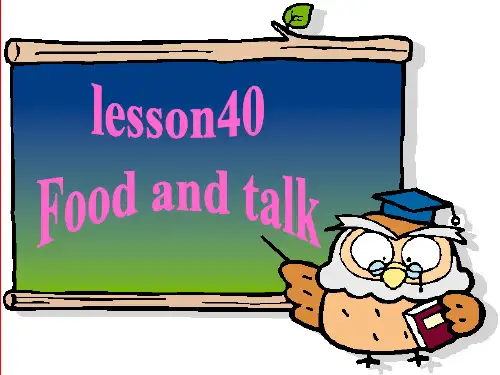
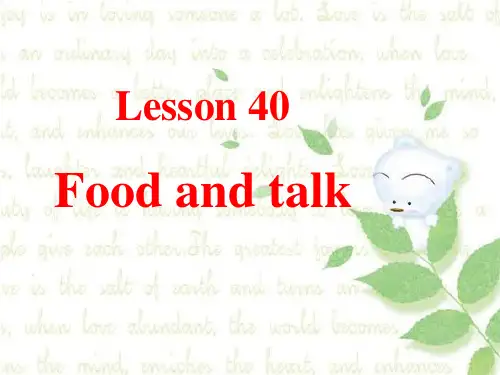
新概念英语第二册第40课课件新概念英语第二册第40课课件,包括单词、语法、课文及中考链接试题,很实用。
L40 Food and Talk新概念英语第二册第40课课件,包括单词、语法、课文及中考链接试题,很实用。
复习L39课间接引语与直接引语课间接引语与直接引语复习1.She asked, “Did he go home?” She asked if/whether he had gone home. 2.She asked, “Why did he leave?” She asked why he had left. 3.He asked, “When will she e back?” He asked when she would e back.新概念英语第二册第40课课件,包括单词、语法、课文及中考链接试题,很实用。
Listen and answer questions1.Where did the writer sit at the dinner party? The writer was sitting next to Mrs.Rumbold. 2.How was the conversation between the writer and Mrs.Rumble? The conversation didn’t go very well. 3.Did Mrs.Rumble answer the writer’s question? No,she didn’t.新概念英语第二册第40课课件,包括单词、语法、课文及中考链接试题,很实用。
Food and talkLast week at a dinner party,the hostess asked me to sitnext to Mrs.Rumbold.Mrs.Rumbold was a large, unsmiling lady in a tight black dress. She did not even look up when I took my seat beside her. Her eyes were fixed on her plate and in a short time, she was busy eating.I tried to make conversation.新概念英语第二册第40课课件,包括单词、语法、课文及中考链接试题,很实用。
新概念英语2逐句精讲Lesson401. Last week at a dinner party, the hostess asked me to sit next to Mrs. Rumbold.在上星期一次宴会上,女主人安排我坐在了兰伯尔德夫人的身旁。
语言点1 cocktail party 鸡尾酒会birthday party 生日聚会tea party 茶话会dinner party 宴会evening party 晚会garden party 游园会weekend party 周末晚会Christmas party 圣诞晚会语言点2 sit next to sb.坐在某人的旁边,相当于sit close to sb2. Mrs. Rumbold was a large, unsmiling lady in a tight black dress.兰伯尔德夫人是一位身材高大、表情严肃的女人,穿着一件紧身的黑衣服。
语言点1 large 和 unsmiling两个形容词修饰lady,作前置定语,而 in a tight black dress则是介词短语作后置定语修饰lady。
语言点2 修饰男人“胖”的词汇:strong,heavy,sturdy;修饰女人“胖”的词汇:large,plump。
3. She did not even look up when I took my seat beside her.当我在她旁边坐下时,她甚至连头都没有抬一下。
语言点 look up意为“向上看”,请参考Lesson 15课文分析。
4. Her eyes were fixed on her plate and in a short time, she was busy eating.她的眼睛盯着她的盘子,不一会儿就忙着吃起来了。
语言点1 fix on=stare at=gaze at=focus on 盯着语言点2 busy表达某人忙于做某事时,常用以下两种表达:1) be busy doing sth.I am busy preparing supper.我正在忙着准备晚饭。
逐句精讲新概念英语第二册:第40课进餐与交谈Lesson40 Food and Talk新概念2课文内容:Last week at a dinner-party, the hostess asked me to sit next to Mrs Rumbold. Mrs Rumbold was a large, unsmiling lady in a tight black dress. She did not even look up when I took my seat beside her. Her eyes were fixed on her plate and in a short time, she was busy eating.I tried to make conversation. 'A new play is coming to" The Globe" soon,' I said. "Will you be seeing it ?"'No,'she answered. 'Will you be spending your holidays abroad this year?' I asked. 'No,' she answered. 'Will you be staying in England?' I asked. 'No,' she answered. In despair, I asked her whether she was enjoying her dinner. 'Young man,' she answered,'if you ate more and talked less, we would both enjoy your dinner !'语法归纳:虚拟语气一句话总结:虚拟语气只用于非真实条件句中,表达假设的或实现可能性不大的情况,通常表达的只是一种愿望、假设、怀疑或是推测。
新概念英语第二册:第40课课文详解及
语法解析
新概念英语第二册:第40课课文详解及语法解析课文详注 Further notes on the text
1.next to, 挨着。
它既能够表示座位挨着也能够表示地理位置上挨着:
Who was the man sitting next to you during the meeting?
开会时坐在你旁边的那人是谁?
There's a field/shop next to our house.
我们家房子边上有一片田野/一个商店。
2.Mrs. Rumbold was a large, unsmiling lady in a tight black dress.兰伯尔德夫人是一位身材高大、表情严肃的女人,穿一件紧身的黑衣服。
(1)unsmiling的反义词为smiling(微笑的,喜气洋洋的)。
有些形容词前面能够加上前缀un-来表示相反的意义:comfortable (舒服的)/uncomfortable(不舒服的),true(真实的)/untrue(不真实的),interesting(有趣的)/uninteresting(无趣味的,乏味的)。
(2)in在这里表示“穿着”、“戴着”:
A young man in a blue dress is inquiring for you.
有位穿蓝衣服的小伙子在找您。
3.take one's seat, 在指定的位置上就座。
take a seat表示“坐下”,比sit要正式:
Please take a seat.
请坐。
take one's seat则表示位置事先已安排好:
After everyone had taken his seat, the meeting/dinner party began.
大家各自就座后,会议/宴会便开始了。
4.Her eyes were fixed on her plate and in a short time, she was busy eating. 她的眼睛盯着自己的盘子,不一会儿就忙着吃起来了。
(1)fix最常用的意思为“使……固定”、“安装”:
she fixed a handle on the door.
她在门上安了个把手。
fix on的含义之一为“使(目光、注意力等)集中于”、“盯着”:
He fixed his eyes on the book, but he couldn't understand a word.
他的眼睛盯着那本书,但他一个字儿也没看懂。
(2)busy+ doing sth.表示“忙着做某事”, doing前能够加
in,也能够不加:
They are busy (in) repairing the car.
他们正忙着修车。
We're all busy getting ready for the performance.
我们都在忙着为演出实行准备。
5.If you ate more and talked less…如果你多吃点,少说点……
在并列句中,相同的句子成分(如主语、谓语、状语等)通常由同一词性的单词/词组表示,并且它们的长度也差不多,以保持句子的平衡性。
在课文中的这句话中ate与talked对应,more与less对应。
再如:
You can either go out or stay here.
你出去也行,呆在这里也行。
He wants to buy a lot of things, but he has little money.
他想买的东西很多,但他的钱很少。
语法 Grammar in use
第2类条件句
在第16课的语法中,我们学习了第1类条件句,它谈论将有可
能发生的事情,并且考虑其将来的真实结果。
它的一般形式如下所
示:
You'll miss the train if you don't hurry.
你如果不抓紧时间会误了火车的。
(主句用一般将来时,从句用
一般现在时或其他形式的现在时)
第2类条件句的形式与第一类不同,if从句中用一般过去时,谈论想像的情况,主句用would +动词原形,推测想像的结果:If it rained tomorrow, we'd stay at home.
如果明天下雨,我们将呆在家里。
即使第2类条件句使用过去时,却并非指过去的时间,所以,if 之后的过去时用法常被称为“非真实的过去”。
第2类条件句有时能够代替第1类条件句来描述颇有可能发生的事情,但比第1类条件句较为“无把握”。
试比较:
If you went by train,you would get there earlier.
如果你坐火车去。
你或许会早些到那儿。
If you go by train,you will get there earlier.
如果你坐火车去,你就会到得早些。
不过第2类条件句经常用来描写完全不可能的事情:
If I had longer legs, I'd be able to run faster.
如果我的腿再长一点儿,我就能跑得更快了。
在最后一个例句中,the weather是单数,按语法规则,在正常的陈述句中它后面应为was而不是were。
但在第2类条件句中,were 比was更为正式,与真实情况的差别也更大:If
he were/was ready, I would go.
如果他准备好了,我就去。
if I were you这种说法经常用于提出建议:
If I were you, I'd accept their offer.
如果我是你,我就接受他们的建议。